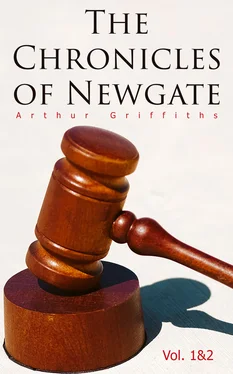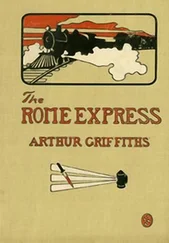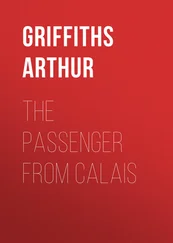1 ...6 7 8 10 11 12 ...40 It will be made pretty plain, I think, in subsequent pages, that these wise and righteous regulations were both flagrantly ignored and systematically contravened. The rule against farming out the prison may have been observed, and it may not be clearly proved that the sheriffs ever took toll from the gaoler. But the spirit of the law, if not its letter, was broken by the custom which presently grew general of making the gaolership a purchaseable appointment. The buying and selling of offices, of army commissions, for instance, as we have seen practised within recent years, at one time extended also to the keeperships of gaols. It is recorded in the Calendar of State papers that one Captain Richardson agreed for his place as keeper of Newgate for £3000. A larger sum, viz. £5000, was paid by John Huggins to Lord Clarendon, who “did by his interest” obtain a grant of the office of keeper of the Fleet prison for the life of Huggins and his son. One James Whiston, in a book entitled ‘England’s Calamities Discovered, or Serious Advice to the Common Council of London,’[22] strongly remonstrates against this practice, which he stigmatizes as “bartering justice for gold.” His language is plain and forcible. “Shall the public houses built at the city charges [it appears that at that time Ludgate, Newgate, the Fleet, and the Compters were all put up to the highest bidder] be sold for private lucre? … He that sells a gaoler’s place sells the liberty, the estate, the person, nay, the very lives of the prisoners under his jurisdiction.” “Purchased cruelty,” the right to oppress the prisoners, that is to say, in order to recover the sums spent in buying the place, “is now grown so bold that if a poor man pay not extortionary fees and ruinous chamber-rent, he shall be thrown into holes and common sides to be devoured by famine, lice, and disease. I would fain know,” he asks, “by what surmise of common sense a keeper of a prison can demand a recompense or fee from a prisoner for keeping him in prison? … Can he believe that any person can deserve a recompense for opening the door of misery and destruction? … But now such is the confidence of a purchaser, that to regain his sum expended he sells his tap-house at prodigious rates, … he farms his sheets to mere harpies, and his great key to such a piece of imperious cruelty (presumably his chief turnkey) as is the worst of mankind.” Following the same line of argument, he says “it will perhaps be thought impertinent to dispute a gaoler’s demands for admitting us into his loathsome den, when even the common hangman, no doubt encouraged by such examples, will scarce give a malefactor a cast of his office without a bribe, demands very formally his fees, forsooth, of the person to be executed, and higgles with him as nicely as if he were going to do him some mighty kindness.” Eventually an act was passed specifically forbidding the sale of such places. This statute affirms that “none shall buy, sell, let, or take to farm, the office of under-sheriff, gaoler, bailiff, under pain of £500, half to the king and half to him that shall sue.”
Before leaving the subject of the sheriffs’ jurisdiction in regard to Newgate, it may be interesting to refer to a conflict between them and the Corporation as to the right to appoint the gaoler. It is recorded in the State papers, under date March 1, 1638, that Isaac Pennington and John Wollaston were elected and sworn sheriffs for the ensuing year. They went, according to ancient custom, to Newgate, where, having received the keys and the charge of the prisoners from the former sheriffs, they substituted for the actual keeper one James Francklin, who about the 15th of the following October died. Accordingly the sheriffs appointed and settled Henry Wollaston as keeper of the gaol, who peaceably executed the duties of that place for six weeks. The rest of the story is best told in the language of the record. After that time “the Lord Mayor and aldermen, never charging Wollaston with any miscarriage, sent for him to their court at Guildhall, and demanded of him the keys of the said prison, who refusing to deliver them to any without the consent of the sheriffs, was then detained until some officers were sent from the said court, who forcibly brought the officer’s servants intrusted with the said keys and prisoners by the said Wollaston, and, without the knowledge or consent of the said sheriffs, delivered them to Richard Johnson, a young man not free of the city, clerk to the recorder, whom they (the sheriffs, from whom this protest comes) consider to be very unfit for such a trust. For redress, the sheriffs by all fair means have applied themselves divers times to the Lord Mayor and court of aldermen, who refuse to restore the said Wollaston. The sheriffs conceive that the trust and keeping of the said gaol, both by law and reason, ought to be in their disposition, and that it is inseparable, incident to, and of common right belonging to their office, they being liable to punishments for any escapes, and amerciaments for non-appearance of prisoners in Her Majesty’s courts of justice, with many other such like damages and fears.”
How the case was finally settled does not appear. But the matter was one in which the king (Charles I.) would probably claim to have a voice. The appointment might be in the gift and actually made by the Corporation, but the city authorities were often invited by the Court to put in some royal nominee, a request which might easily be interpreted into a command. Thus in April 1594, the Lords of the Council addressed the mayor, aldermen, and sheriffs, soliciting them to appoint Richard Hutchman, one of Her Majesty’s sergeants-at-arms, keeper of Newgate, vice Dios, deceased. In June the Corporation reply that they regret they cannot appoint Hutchman. The Lords’ Council now issue a peremptory order to place him in office, which was done, but the Corporation was not to be beaten. Next year a fresh representation is made to the Lords in Council, stating the reasons why the city authorities had dismissed Mr. Hutchman from his place.
Another State paper, dated 1633, gives a draft of a letter recommending one A. B. for the appointment of keeper, vacant by the “nomination of one not deemed to have been legally put in.” Some seventy years later, according to another authority, the question was definitely settled. In this (dated 1708) it is set forth that “the keeper of the prison holds that place of great trust under the queen (Anne), giving about £8000 security, and the prison is turned over to each of the new sheriffs when sworn in by delivering them a key. The place is in the gift of the Lord Mayor and aldermen.”
Let us return to Mediæval Newgate. Whatever the authority, whether royal or civic, the condition of the inmates must have been wretched in the extreme, as the few brief references to them in the various records will sufficiently prove. The place was full of horrors; the gaolers rapacious and cruel. In 1334 an official inquiry was made into the state of the gaol, and some of the atrocities practised were brought to light. Prisoners detained on minor charges were cast into deep dungeons, and there associated with the worst criminals. All were alike threatened, nay tortured, till they yielded to the keepers’ extortions, or consented to turn approvers and swear away the lives of innocent men. These poor prisoners were dependent upon the charity and good-will of the benevolent for food and raiment. As far back as 1237 it is stated that Sir John Pulteney gave four marks by the year to the relief of prisoners in Newgate. In the year 1385 William Walworth, the stalwart mayor whose name is well remembered in connection with Wat Tyler’s rebellion, gave “somewhat” with the same good object. “So have many others since,” says the record. The water supply of the prison, Stowe tells, was also a charitable gift. “Thomas Knowles, grocer, sometime Mayor of London, by license of Reynold, prior of St. Bartholomew’s in Smithfield, and also of John Wakering, master of the hospital of St. Bartholomew, and his brethren, conveyed the waste of water at the cistern near unto the common fountain and Chapel of St. Nicholas (situate by the said hospital) to the gaols of Ludgate and Newgate, for the relief of the prisoners.”
Читать дальше












